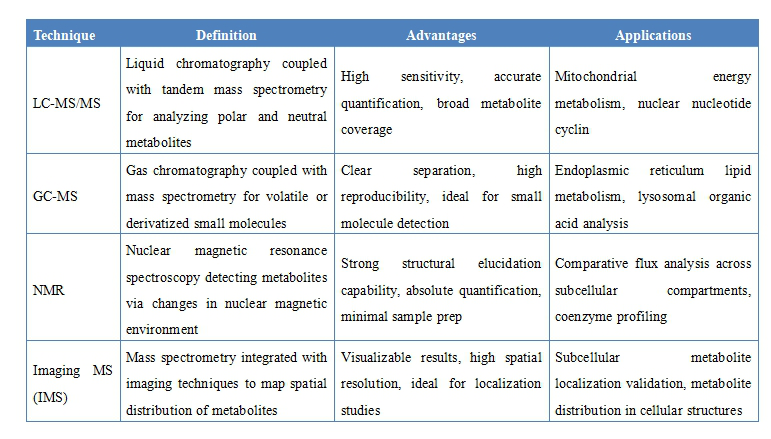Subcellular Structure & Organelle Metabolomics Service
Cellular metabolism is spatially compartmentalized across organelles such as mitochondria, endoplasmic reticulum, and peroxisomes, each orchestrating distinct metabolic functions. Decoding organelle-specific metabolic states is critical to understanding cellular physiology, signaling pathways, and disease mechanisms. However, the intrinsic challenges—such as organelle isolation, metabolite stability, and dynamic changes—have historically limited deep characterization.
MtoZ Biolabs offers a full-spectrum Subcellular Structure & Organelle Metabolomics Service that leverages advanced analysis platforms and integrative bioinformatics to enable accurate identification, quantification, and interpretation of metabolites within defined organellar compartments. This service empowers researchers to dissect the metabolic architecture and reprogramming at the subcellular level.
Services at MtoZ Biolabs
The Subcellular Structure & Organelle Metabolomics Service at MtoZ Biolabs provides both targeted and untargeted metabolomics approaches to suit different research needs. Targeted metabolomics focuses on specific metabolites using techniques such as Multiple Reaction Monitoring (MRM) and Parallel Reaction Monitoring (PRM), offering high sensitivity for dynamic monitoring and biomarker quantification. Untargeted metabolomics, powered by high-resolution platforms like Orbitrap and QTOF, enables broad-spectrum analysis of known and novel metabolites, uncovering hidden metabolic pathways and inter-organelle transport dynamics.
We provide specialized metabolomic profiling for a range of subcellular structures, including but not limited to:
· Nuclear Metabolomics: Reveals nuclear metabolite roles in gene expression and epigenetic regulation.
· Endoplasmic Reticulum Metabolomics: Focuses on metabolites related to protein folding, lipid biosynthesis, and ER stress response.
· Golgi Apparatus Metabolomics: Analyzes metabolic shifts during protein modification and vesicle trafficking.
· Mitochondrial Metabolomics: Investigates pathways of oxidative phosphorylation, energy metabolism, and redox balance.
· Lysosomal Metabolomics: Profiles key metabolites involved in autophagy and degradation pathways.
· Peroxisome Metabolomics: Tracks fatty acid β-oxidation and reactive oxygen species (ROS) detoxification processes.
· Exosomes Metabolomics: Characterizes metabolite cargo in extracellular vesicles to study intercellular communication.
· Plasma Membrane Metabolomics: Explores membrane-associated lipid signaling and receptor-triggered metabolic regulation.
· Chloroplast Metabolomics (for plant cells): Supports research in photosynthesis-related metabolism and light-dependent biochemical pathways.

Experimental Instruments
Our Subcellular Structure & Organelle Metabolomics Service is powered by an integrated suite of cutting-edge technologies, including:

Why Choose MtoZ Biolabs?
✔ Multi-Platform Integration: Simultaneous use of LC-MS, GC-MS, and NMR ensures wide metabolite coverage.
✔ Comprehensive Data Analysis: Includes metabolic pathway mapping, network modeling, and biomarker prediction.
✔ Organelle-Specific Strategies: Custom-designed workflows tailored to the unique biology of each organelle.
✔ High Sensitivity Meets High Throughput: Compatible with low-input samples and capable of detecting low-abundance metabolites.
✔ One-Time-Charge: Our pricing is transparent, no hidden fees or additional costs.
FAQ
Q1: How does MtoZ Biolabs ensure the purity of isolated organelles, and does this affect metabolite quantification?
We utilize ultracentrifugation, commercial isolation kits, and immunomagnetic bead enrichment to achieve high-purity organelle fractions. Validation of organelle markers via Western blotting or antibody staining is included to ensure separation quality, thus supporting accurate metabolite quantification.
Q2: How should I choose between targeted and untargeted metabolomics for organelle analysis?
For hypothesis-driven studies focusing on known metabolites or pathways, targeted metabolomics offers precision and sensitivity. For discovery-based studies aiming to identify novel metabolic features or unknown pathways, untargeted metabolomics is more suitable. We can assist in selecting the optimal strategy based on your research goals.
Beyond the Subcellular Structure & Organelle Metabolomics Service, MtoZ Biolabs offers complementary multi-omics solutions—including proteomics, lipidomics, and transcriptomics—designed to provide a comprehensive view of organelle function and dynamics. With advanced analytical platforms and robust bioinformatics pipelines, we deliver high-quality data and tailored insights to support research in fundamental biology, disease modeling, and therapeutic development.
Contact us today to discuss your project and receive expert consultation from our scientific team.
Related Services
Subcellular Structure & Organelle Proteomics Service
How to order?







